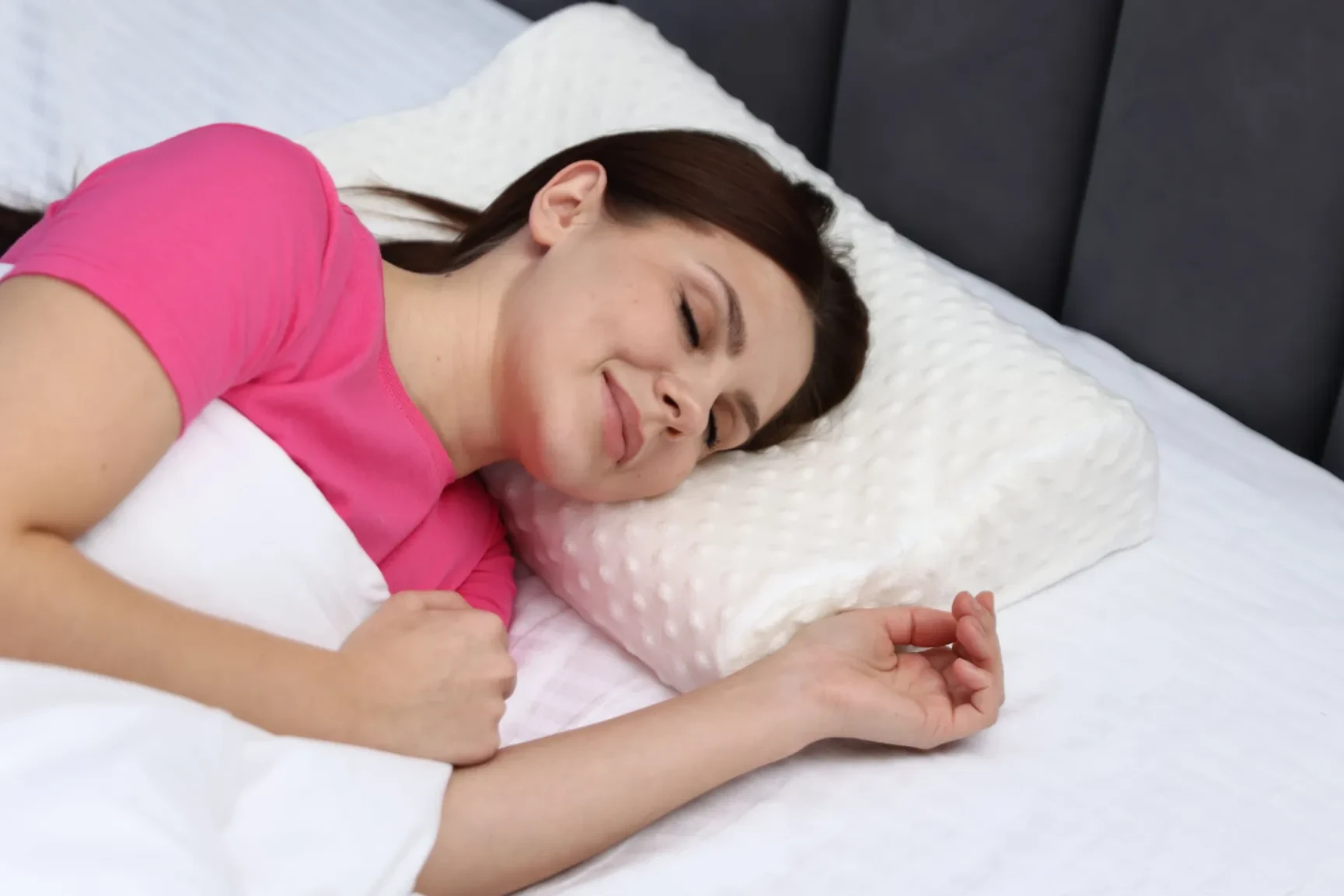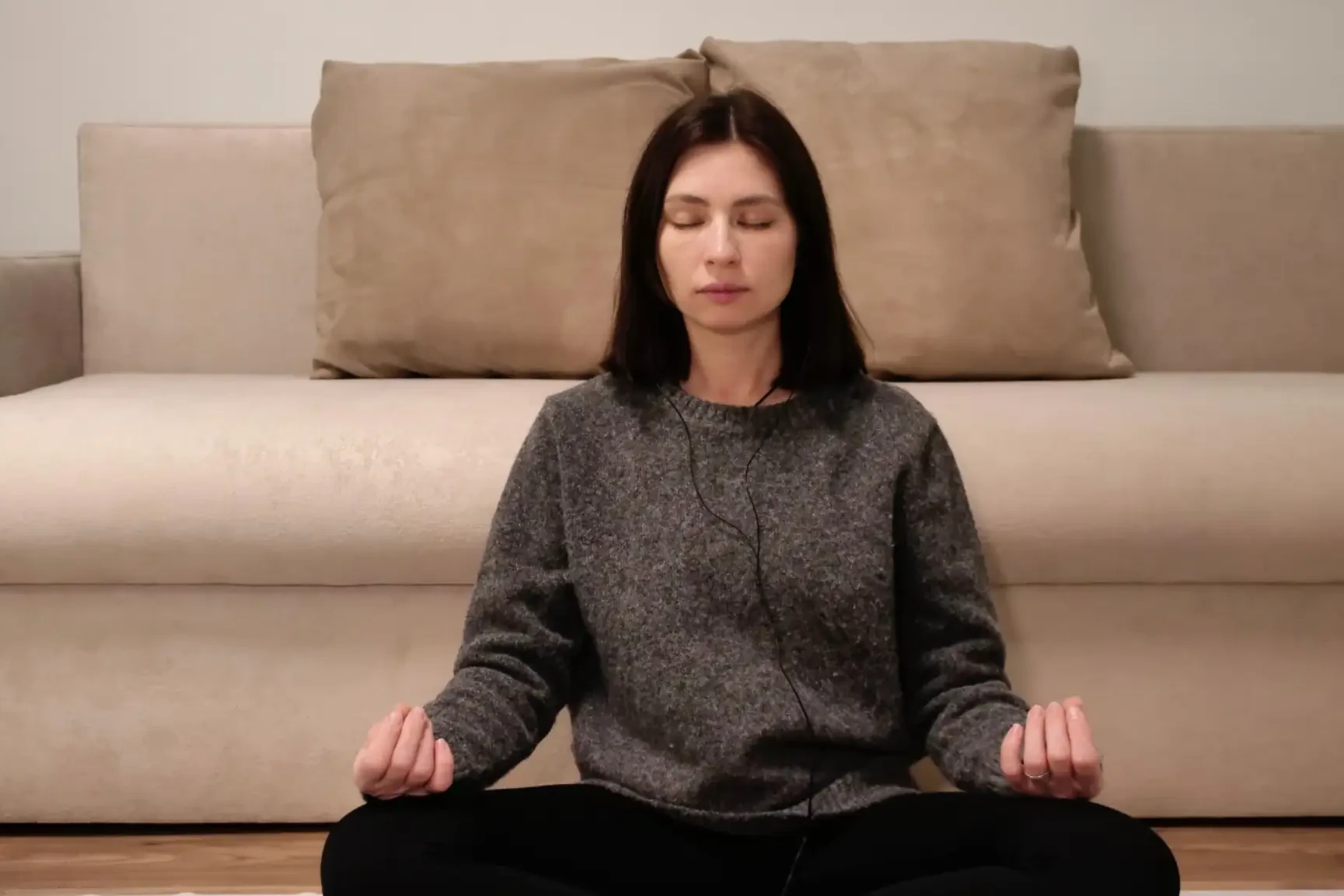We check our phones before bed, scroll endlessly through social media, and sleep with them under our pillows. It feels harmless, right? But over time, these habits quietly reshape how our brains rest, repair, and recover. The impact of smartphone use on sleep patterns is more serious than it seems—and most of us don’t even know it.
In this blog, we will break down the impact of smartphone use on sleep patterns, how smartphones disrupt your sleep, who it affects the most, what real research says, and how you can take back control of your nights.
Table of Contents
ToggleWhy Sleep Matters More Than You Think?
Sleep isn’t just about closing your eyes. It’s about restoring the body and mind. Most of what keeps us healthy starts with good sleep.
The 4 Stages of Sleep and Why Deep Sleep Is Critical
Sleep happens in stages. Each stage plays a role in how refreshed you feel in the morning.
- Stage 1 (Light Sleep): Your body starts to relax.
- Stage 2 (Deeper Light Sleep): Brain slows down; heart rate drops.
- Stage 3 (Deep Sleep): This is when your body heals and grows.
- REM Sleep (Rapid Eye Movement): Your brain processes memory, learning, and emotions.
If deep sleep or REM sleep is disturbed, your body doesn’t fully recover. Even if you sleep 8 hours, you might still feel tired.
Bonus Read → Debunking the 8 Hour Sleep Rule: What You Need to Know
Recommended Hours of Sleep by Age Group
According to the National Sleep Foundation, here’s how much sleep each age group needs:
| Age Group | Recommended Sleep Hours |
|---|---|
| Infants (4-11 months) | 12-15 hours |
| Toddlers (1-2 years) | 11-14 hours |
| Preschoolers (3-5 years) | 10-13 hours |
| School-age (6-13 years) | 9-11 hours |
| Teens (14-17 years) | 8-10 hours |
| Adults (18-64 years) | 7-9 hours |
| Older Adults (65+) | 7-8 hours |
CDC data says 1 in 3 adults in the U.S. don’t get enough sleep. That’s not just a personal problem, it’s a public health issue due to the impact of smartphone use on sleep patterns.
The Impact of Smartphone Use on Sleep Patterns
The impact of smartphone use on sleep patterns can be attributed to a combination of physiological and behavioral factors.
Using your phone at night seems harmless. But it deeply affects your sleep quality. Let’s understand the science behind it.
Know More → Relationship Between Caffeine and Sleep Quality
How Blue Light Affects Melatonin and Sleep Patterns?
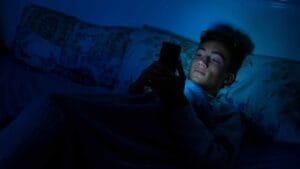
Numerous studies have highlighted the impact of smartphone use on sleep patterns , particularly due to the blue light emitted from screens.
Smartphones emit blue light. Your eyes send this light to your brain. It confuses your brain into thinking it’s daytime.
- Melatonin, the sleep hormone, gets reduced.
- Your sleep cycle gets delayed.
- You feel awake when you should feel sleepy.
Harvard Health reports blue light can reduce melatonin by up to 50%.
The impact of smartphone use on sleep patterns continue into late hours, their already delayed sleep phase is further pushed back, contributing to chronic sleep deprivation. Over time, this can affect mood, concentration, academic performance, and overall health.
Read → Why Sleep Quality Matters More Than Sleep Quantity
How Phone Notifications Keep the Brain Alert?
Even silent pings or vibrations activate your brain.
- It increases mental activity.
- Disrupts your ability to fall asleep.
- Raises heart rate and brain wave activity.
The mind stays alert, thinking “what’s next?” and impact of smartphone use on sleep patterns is continued.
Dopamine Loops, Social Media, and Mental Stimulation at Night
Social media feeds are designed to give you hits of dopamine and the impact of smartphone use on sleep patterns is adverse.
- Dopamine keeps your brain in reward mode.
- It makes it hard to stop scrolling.
- Even after putting your phone down, your brain stays active.
This constant stimulation keeps your body from relaxing into sleep. Additionally, the fear of missing out (FOMO) can create a psychological dependency on staying connected, further reinforcing bedtime phone habits. This anxiety makes it harder to disconnect and contributes to insomnia.
Why Scrolling Before Bed Delays REM Sleep?
When your brain stays alert, REM sleep gets delayed.
- REM sleep helps your memory and emotional health.
- Less REM means more mood swings and poor focus.
- You wake up feeling tired and cranky.
Sleep Foundation reports phone use before bed increases time to fall asleep and reduces REM sleep.
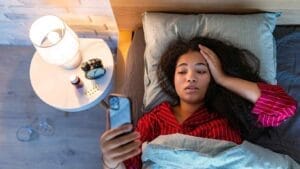
Who is Most at Risk?
The impact of smartphone use on sleep patterns is everywhere. Everyone with a smartphone is at risk. But some groups are more affected than others.
Teens and Students
- Peer pressure to stay online
- Social media use spikes at night
- FOMO (Fear of Missing Out) drives late scrolling
Night-Shift Workers
- Use phones during breaks to stay awake
- Light exposure throws off circadian rhythm
Parents Using Phones to “Wind Down”
- Think it’s relaxing, but it does the opposite
- Blue light delays melatonin release
People with Existing Sleep Disorders
- Insomnia and apnea worsen with screen exposure
- Anxiety builds with poor sleep hygiene
Read → Can Meditation Improve Sleep for Those With Anxiety?
Behavioral Trends and Sleep Patterns Across Age Groups
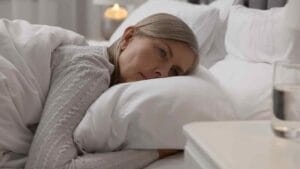
Recent data shows that younger generations are more affected by the impact of smartphone use on sleep patterns . Teenagers and young adults are the heaviest users of smartphones, especially in the hours leading up to bedtime. In contrast, older adults tend to use their phones less frequently at night, which might contribute to fewer sleep-related issues.
Gender differences have also been observed, with women more likely to engage in bedtime social media use and experience higher levels of smartphone-related anxiety. This suggests that personalized interventions may be needed to address different demographics more effectively.
Dr. Chugh’s Tips to Break the Habit and Sleep Better
You can improve your sleep without tossing your phone.
Here’s how:
The 30-Minute Rule: No Screens 30 Minutes Before Bed
Give your brain time to unwind naturally.
- Melatonin levels rise without screen exposure
- Helps fall asleep faster
- Improves deep and REM sleep
Switch to Night Mode or Blue Light Filters
To minimize the impact of smartphone use on sleep patterns, many phones have built-in options:
- iOS: Night Shift
- Android: Night Light
- Apps: f.lux, Twilight
They reduce blue light but don’t replace full disconnection.
Set App Limits and Bedtime Reminders
Use phone features to create boundaries:
- Set downtime for social apps
- Reminders to sleep at same time daily
- Track screen time habits
Create a Tech-Free Wind-Down Routine
Instead of screens:
- Read a paper book
- Journal your thoughts
- Listen to soft music or guided meditation
The brain needs quiet time before bed.
Replace Screen Time With Mindful Activities
- Coloring books for adults
- Breathing exercises
- Gentle stretching or body scans
These help the brain slow down for sleep.
Alternatives to Support Healthy Sleep
When considering the impact of smartphone use on sleep patterns , it’s helpful to look at alternatives that don’t involve screens. Tools like white noise machines or ambient sound players can create a relaxing environment without the need for devices. Blue light blocking glasses and non-backlit e-readers are other great options for evening use.
Cognitive Behavioral Therapy for Insomnia (CBT-I) is a proven approach for treating sleep disorders. This non-medication therapy helps individuals reshape negative thoughts and behaviors around sleep. CBT-I, combined with improved sleep hygiene, can offer lasting benefits without relying on screens.
Read → 5 Yoga Poses for Better Sleep and Relaxation
The Role of Sleep Environment and Consistency
The sleeping environment plays a crucial role in minimizing the impact of smartphone use on sleep patterns . A dark, quiet, and cool room encourages natural melatonin production. Avoiding large meals, caffeine, and intense workouts in the evening also contributes to better sleep.
Consistency is equally important. Going to bed and waking up at the same time every day—even on weekends—helps regulate the body’s internal clock. When combined with smartphone boundaries, this routine creates a solid foundation for healthy, restorative sleep.
Dr. Chugh’s Closing Advice on Sleep
Sleep is not magic. It’s a skill your brain can re-learn with the right habits. The impact of smartphone use on sleep patterns isn’t about the phone alone. It’s about how we use it.
You don’t need to quit tech. You just need to set limits and stick to healthy bedtime rules.
Small, daily changes can transform how you sleep, feel, and live.
Want help? Book a consultation with Dr. Chandril Chugh, a board-certified neurologist. Let’s get to the root of your sleep issues together.
Conclusion
The impact of smartphone use on sleep patterns cannot be ignored. From delayed melatonin release to psychological overstimulation and sleep fragmentation, smartphones affect every aspect of our rest. The more we understand these effects, the better we can develop habits that support our physical and mental well-being.
Reducing nighttime screen time, creating a sleep-friendly environment, and adopting consistent routines are all key to minimizing sleep disruption. While smartphones have become a permanent part of modern life, they don’t have to control our sleep. With a balanced approach, it’s possible to enjoy technology without sacrificing the rest we need to thrive.
Frequently Asked Questions (FAQs)
What is the impact of smartphone use on sleep patterns?
The impact of smartphone use on sleep patterns is significant. Smartphones emit blue light that suppresses melatonin production, which delays sleep onset and reduces sleep quality. Engaging with phones before bedtime also stimulates the brain, making it harder to wind down and rest.
How does smartphone use affect the body’s natural sleep-wake cycle?
Smartphone use at night disrupts the circadian rhythm by delaying melatonin release. This shifts the sleep-wake cycle later, causing difficulty falling asleep and resulting in fewer hours of restorative sleep.
Can smartphone notifications interrupt sleep even when you’re not using the phone?
Yes, nighttime notifications, vibrations, or screen light can cause micro-awakenings. Even brief disruptions impact the depth of sleep and can lead to grogginess and fatigue during the day.
What are the psychological effects of smartphone use on sleep?
Smartphone use, especially for social media or video content, increases mental stimulation and anxiety. This can delay sleep, increase restlessness, and contribute to poor sleep hygiene over time.
Are sleep-tracking apps helpful or harmful?
Sleep-tracking apps can offer helpful data, but they may also increase screen exposure and cause users to become anxious about their sleep. Used mindfully and not right before bed, they can be beneficial.
Does the impact of smartphone use on sleep patterns vary by age or gender?
Yes, studies show that younger adults and teenagers are more affected due to heavier screen use. Gender differences also exist, with women reportedly more sensitive to smartphone-related anxiety affecting sleep.
What are some healthy habits to reduce the impact of smartphone use on sleep patterns?
Avoid screens at least an hour before bed, use blue-light filters, keep phones out of the bedroom, and replace nighttime scrolling with calming, non-digital routines such as reading or meditation.
Are there non-digital alternatives for improving sleep?
Yes, non-digital options include ambient noise machines, traditional alarm clocks, and cognitive behavioral therapy for insomnia (CBT-I). These help improve sleep without the side effects of screen exposure.
What future trends might reduce the impact of smartphone use on sleep patterns?
Future trends include smart home tech, improved blue-light filtering, and AI-powered sleep coaching. These tools aim to help users balance screen use with healthier sleep practices.
When should I seek professional help for sleep problems related to smartphone use?
If you’re consistently experiencing insomnia, fatigue, or mood issues due to late-night phone use, consult a sleep specialist. They can assess whether screen use is disrupting your sleep and recommend tailored solutions.
About The Author

Medically reviewed by Dr. Chandril Chugh, MD, DM (Neurology)
Board-Certified Neurologist
Dr. Chandril Chugh is a U.S.-trained, board-certified neurologist with expertise in diagnosing and managing neurological disorders, including migraines, epilepsy, Parkinson’s disease, and movement disorders. His clinical focus includes evidence-based neurological care and patient education.
All content is reviewed for medical accuracy and aligned with current neurological guidelines.



